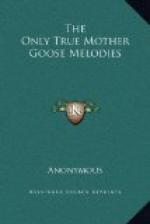The first book of the kind known to be printed in this country bears the title of “Songs for the Nursery; or, Mother Goose’s Melodies for Children.” Something probably intended to represent a goose with a very long neck and mouth wide open, covered a large part of the title page, at the bottom of which, Printed by T. Fleet[*], at his printing house, Pudding Lane, 1719. Price, two coppers. Several pages were missing, so that the whole number could not be ascertained.
[*][Note from Brett: T. Fleet is probably Thomas Fleet (1685-1758) and is referenced by John Fleet Elliot (a descendent). Thomas Fleet was married to Elizabeth Goose (AKA Vertigoose), and is the presumed author. Unfortunately, modern research and research at the time failed to substantiate the existence of this book. This information is culled in part from the introduction to L. Frank Baum’s edition of “Mother Goose” in 1897. The introduction written by Mr. Baum considered this line of reasoning and this article is referenced by him.]
This T. Fleet, according to Isaiah Thomas[*], was a man of considerable talent and of great wit and humor. He was born in England, and was brought up in a printing office in the city of Bristol, where he afterwards worked as a journeyman. Although he was considered a man of sense, he was never thought to be overburdened with religious sentiments; he certainly was not in his latter days. Yet he was more than suspected of being actively engaged in the riotous proceedings connected with the trial of Dr. Sacheverell, in Queen Ann’s time. In London, Bristol, and many other places, the mobs and riots were of a very serious nature. In London several meeting houses were sacked and pulled down, and the materials and contents made into bonfires, and much valuable property destroyed. Several of the rioters were arrested, tried and convicted. The trials of some of them are now before me. How deeply Fleet was implicated in these disturbances was never known, but being of the same mind with Jack Falstaff, that “the better part of valor is discretion,” thought it prudent to put the Ocean between himself and danger. He made his way to this country and arrived in Boston, 1712. Being a man of some enterprise he soon established a printing office in Pudding Lane (now Devonshire Street), where he printed small books, pamphlets, ballads, and such matter as offered. Being industrious and prudent, he gradually accumulated property. It was not long before he became acquainted with the “wealthy family of Goose,” a branch of which he had before known in Bristol, and was shortly married to the eldest daughter.
[*][Note from Brett: Publisher of an American volume of Mother Goose in 1787, “Mother Goose’s Melody: or Sonnets for the cradle.” This is a reprint of the collection put together by John Newbury (known for the Newbury medal).]




